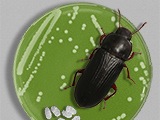Julien Dhinaut PhD thesis
 Evolutionary ecology of immune priming in the mealworm beetle, Tenebrio molitor
Evolutionary ecology of immune priming in the mealworm beetle, Tenebrio molitor
Defended on the 6th December 2017
Funding: ministry of research
Supervisor: Yannick Moret
Started in October 2014
Abstract
Many organisms can improve their immune response as a function of their immunological experience, a phenomenon called immune priming. While the mechanisms through which immune priming is achieved remain unknown, individuals that survived to a given parasite are better protected against subsequent exposures. This immune priming can cross generations (trans-generational immune priming – TGIP), preparing offspring for prevailing parasite environment. Both individual and trans-generational immune priming might be adaptive and may have evolved from repeated challenges by the same pathogens during the host lifetime or across generation. While protection could be cross-reactive, a certain level of specificity may exist in response to the range of pathogens from which immue priming may have evolved. Thus, immune priming and TGIP should be more efficient and less costly with respect to pathogens exposing the host to the greatest probability of re-infection. Moreover, it is now known that insect immune response is genetically variable. To understand the evolution of TGIP and its impact on life history evolution, we need to explore its quantitative genetics. During my thesis, I found that the expression of individual immune priming and TGIP in the mealworm beetle, Tenebrio molitor, is dependent of a range of pathogens that might have been a major selective pressure on the immune system of this insect species. This was done through the characterisation of costs and benefits of the expression of immune priming in response to challenges with a large range of bacterial pathogens. This work also highlighted potential mechanisms through which these immune phenomena could be achieved.
Costs and benefits associated to immune priming and TGIP suggest that Gram-positive bacteria might have been a major selective pressure at the origin of these phenomena in T. molitor. Whether TGIP has genetic basis still required further research.
Keywords
Tenebrio molitor, trans-generational immune priming, quantitative genetics, immunology
Jury
Joël Meunier, université de Tours
Aurélie Tasiemski, université de Lille
Benjamin Gourbal, université de Perpignan
Christine Coustau, CNRS Sophia Agrobiotech
Thierry Rigaud, université de Bourgogne Franche-Comté
Yannick Moret, université de Bourgogne Franche-Comté – supervisor
- extrait:
- lien_externe:
- kc_data:
- a:8:{i:0;s:0:"";s:4:"mode";s:0:"";s:3:"css";s:0:"";s:9:"max_width";s:0:"";s:7:"classes";s:0:"";s:9:"thumbnail";s:0:"";s:9:"collapsed";s:0:"";s:9:"optimized";s:0:"";}
- kc_raw_content:
 Evolutionary ecology of immune priming in the mealworm beetle, Tenebrio molitor
Evolutionary ecology of immune priming in the mealworm beetle, Tenebrio molitorDefended on the 6th December 2017
Funding: ministry of research
Supervisor: Yannick Moret
Started in October 2014
Abstract
Many organisms can improve their immune response as a function of their immunological experience, a phenomenon called immune priming. While the mechanisms through which immune priming is achieved remain unknown, individuals that survived to a given parasite are better protected against subsequent exposures. This immune priming can cross generations (trans-generational immune priming – TGIP), preparing offspring for prevailing parasite environment. Both individual and trans-generational immune priming might be adaptive and may have evolved from repeated challenges by the same pathogens during the host lifetime or across generation. While protection could be cross-reactive, a certain level of specificity may exist in response to the range of pathogens from which immue priming may have evolved. Thus, immune priming and TGIP should be more efficient and less costly with respect to pathogens exposing the host to the greatest probability of re-infection. Moreover, it is now known that insect immune response is genetically variable. To understand the evolution of TGIP and its impact on life history evolution, we need to explore its quantitative genetics. During my thesis, I found that the expression of individual immune priming and TGIP in the mealworm beetle, Tenebrio molitor, is dependent of a range of pathogens that might have been a major selective pressure on the immune system of this insect species. This was done through the characterisation of costs and benefits of the expression of immune priming in response to challenges with a large range of bacterial pathogens. This work also highlighted potential mechanisms through which these immune phenomena could be achieved.
Costs and benefits associated to immune priming and TGIP suggest that Gram-positive bacteria might have been a major selective pressure at the origin of these phenomena in T. molitor. Whether TGIP has genetic basis still required further research.
Keywords
Tenebrio molitor, trans-generational immune priming, quantitative genetics, immunology
Jury
Joël Meunier, université de Tours
Aurélie Tasiemski, université de Lille
Benjamin Gourbal, université de Perpignan
Christine Coustau, CNRS Sophia Agrobiotech
Thierry Rigaud, université de Bourgogne Franche-Comté
Yannick Moret, université de Bourgogne Franche-Comté – supervisor
